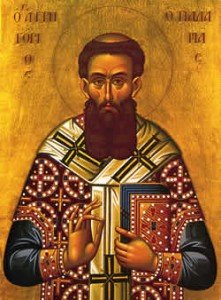One of the very important Eastern Fathers of the Church who is key in the interpretation of Holy Scripture, is St. Gregory Palamas. It was in 1334, while on Mt Athos, in his third year at the hermitage of St. Sabbas, that Palamas experienced a vision in which he was encouraged to share the wisdom bestowed upon him from on high. It seems that he was carrying a vessel overflowing with milk when suddenly it turned into the finest of wines. The wine emitted such a strong fragrance that it brought great joy to his soul. A youth appeared and rebuked him for not sharing the wine with others and for allowing it to go to waste, for this wine, as he explained, was inexhaustible. The angel then warned Gregory, reminding him of the parable of the talents. As he later related to his friend and disciple Dorotheus, Palamas understood this vision to mean that the time would come when he would be called upon to transfer his teaching from the simple plane of the ethical (the milk) to the higher plane of the dogmatic word (the wine), which leads to the Kingdom of heaven. Thus at the age of thirty-eight Gregory began to write his Encomium for St. Peter the Athonite, and, at about the same time, he also began to compose what is without doubt the most famous of all his works, Homily 53, “On the Entry of the Mother of God into the Holy of Holies”, in which the Theotokos is presented as the archetype of the hesychastic way of life, the way of “stillness” – a mystical way of prayer centered around the Jesus Prayer.
The teaching of Saint Gregory and his fellow Hesychasts of the 14th century was based on the understanding that man, the greatest of all God’s creatures, had been called to enter into direct and unmediated communion with God even from this present life. The chief manner by which this is achieved is through the grace of God and noetic (relating to the activity of the intellect) prayer, that is, through the Prayer of the Heart, also known as the Jesus Prayer. For the Hesychasts, true theology, true knowledge of God, is given not to those whose minds have been exercised in lofty concepts about God, but to those who, through prayer and ascetic striving in accordance with the commandments of Christ, have been made worthy to behold the vision of Christ in glory, to those who have seen God face to face and who share in His very

